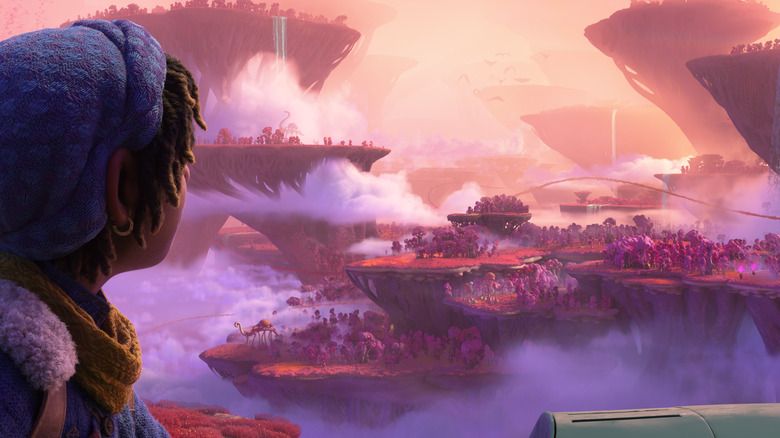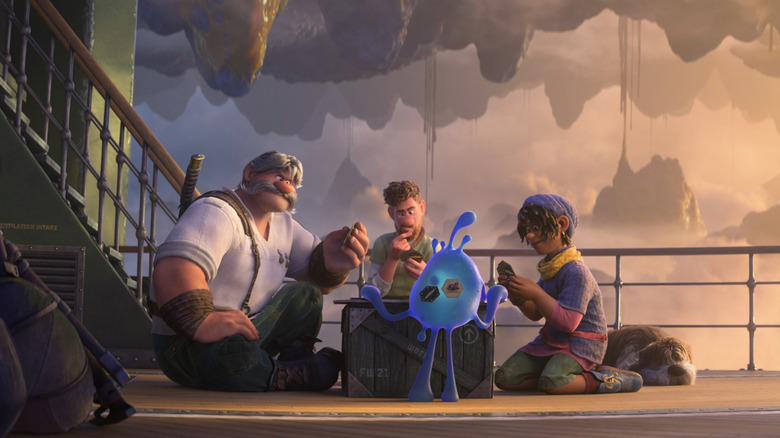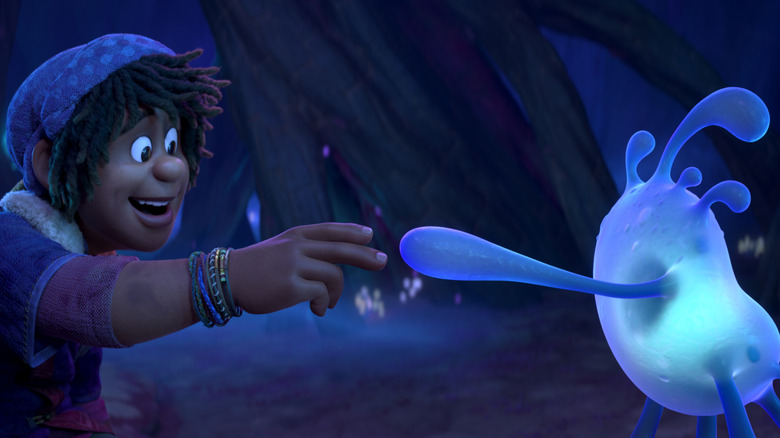Strange World Directors Wanted The Movie To Be More Like The Matrix Than Men In Black [Exclusive]
Warning: Major spoilers ahead for "Strange World."
In the new Disney Animation film, "Strange World," the Clade family lives in a land nestled in the center of a mountain range. The mountains are unpassable ... not that Jaeger Clade (voiced by Dennis Quaid) believes that. He and a group of explorers set off to try to find out what's on the other side of the range, but when his son Searcher (voiced by Jake Gyllenhaal) finds a plant that can bring electricity to the land, he and the rest of the group turn back. Jaeger isn't seen again for 25 years.
When things start going wrong with their powers source, the land's leader, Callisto (voice of Lucy Liu), calls on Searcher — now a farmer of these plants — to help her discover the issue. They along with his wife, Meridian (voiced by Gabrielle Union), their son, Ethan (voiced by Jaboukie Young-White), and the family's three-legged dog, Legend, head out to search for a solution.
If you've seen the film, you know that the land they find themselves in is a wild one, based on pulp magazines and classic science fiction tales from the '40s and '50s. And if you've seen the movie, you know their home isn't what they originally believe it is, either.
'Imagine you discovered that you're living on the back of a living thing and what you're doing is harming that'
It turns out, that their entire world sits on the back of a living, turtle-like creature, and their energy source is killing it. /Film's own Vanessa Armstrong recently spoke to director Don Hall and co-director/writer Qui Nguyen about the ending of "Strange World" and how the endings for "The Matrix" and "Men in Black" helped them keep their own ending on track.
For a species that often refers to the planet we're on as "Mother Earth," we're surprisingly careless with it, and we may be in for some difficult times in the future if we don't take care of the planet now. That's something that Hall and Nguyen wanted viewers to walk away from the film thinking about. The Clades' journey takes place inside a living being, and Hall mentioned that there are a few similar films in that tiny genre, such as "Innerspace," which he points out has a cast member in common with "Strange World" in Dennis Quaid. Other titles like "Journey to the Center of the Earth" inspired "Strange World," though Hall says it was "less of a cinematic inspiration and more of a thematic one."
Hall explains that the idea of the film was, "Imagine you discovered that you're living on the back of a living thing and what you're doing is harming that. What would you do?" He thought of this as a "nice metaphor" for our planet.
Change your perspective, change the world
Nguyen said that it was important that the big revelation actually had an impact on the ending of the film. He said:
"It wasn't just like the ending of 'Men in Black' where it was like, 'Oh, we finished the whole story and then suddenly they're in a marble and you're like, 'Oh, that's cute.' But here, much like in 'The Matrix,' we want that revelation that this wasn't what you thought it was to suddenly change their perspective on how they were going to treat this world."
The ending we see in "Strange World' does have an impact, with Callisto taking responsibility for the decision to kill their power source but save their world, even though she knows it's going to cause a lot of chaos at home. It's similar in some ways to "Men in Black" in that we see the story and the world in a new way. But in "Men in Black," we're nothing more than a game piece for another creature who doesn't care. In "Strange World," we zoom out to see that we're part of a larger ecosystem, and that we all have to work to make it survive, just as the cells and systems in our own bodies are supposed to work to help us.
In "The Matrix," we — through Keanu Reeves' Mr. Anderson — see the bigger, hidden truth of that world. At the end of that film, we do see a change. (Whether or not that carries through in the sequels is up to you, but it does have an impact.) Now, as to whether we'll ever really learn the lesson about taking care of the world we have right now ... well, let's just hope that this one time, life imitates art.


